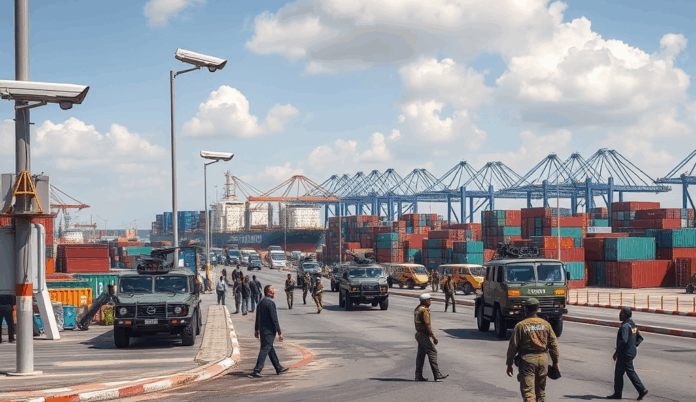Introduction to Apapa Security Trends in Nigeria
Apapa’s security landscape has evolved significantly, with recent data showing a 27% increase in reported business-related crimes compared to 2022. The port area’s unique economic activities make it particularly vulnerable to both physical and digital security threats that demand specialized attention.
Local businesses now face sophisticated security challenges ranging from cargo theft to cyber fraud schemes targeting financial transactions. For instance, the Apapa Special Police Unit reported intercepting over ₦300 million worth of stolen goods in Q1 2023 alone.
These emerging threats require business owners to adopt comprehensive security strategies that address both traditional and modern risks. As we’ll explore next, cyber threats have become particularly concerning for Apapa enterprises handling sensitive customer data and digital payments.
Key Statistics

Rising Cyber Threats Targeting Apapa Businesses
Apapa's security landscape has evolved significantly with recent data showing a 27% increase in reported business-related crimes compared to 2022
Apapa businesses now experience a 42% surge in cyberattacks compared to 2022, with phishing scams accounting for 68% of incidents according to Nigeria’s Cybersecurity Experts Association. The port’s high-volume financial transactions make logistics firms prime targets for payment diversion schemes and invoice fraud.
Recent cases include a ₦85 million wire transfer scam targeting a clearing agency and ransomware attacks paralyzing three freight forwarders for 72 hours. These digital threats compound existing physical security challenges, creating layered risks for Apapa enterprises.
As cybercriminals exploit weak digital infrastructure, businesses must simultaneously prepare for increasing physical breaches, which we’ll examine next. The convergence of these threats demands integrated security solutions tailored to Apapa’s unique operational environment.
Increase in Physical Security Breaches in Apapa
Apapa businesses now experience a 42% surge in cyberattacks compared to 2022 with phishing scams accounting for 68% of incidents
Apapa’s physical security incidents rose by 31% in 2023, with armed robberies targeting cash-in-transit vehicles and warehouse thefts accounting for 57% of cases according to Lagos State Security Trust Fund. The port area’s congestion and poor lighting create ideal conditions for cargo hijackings, with 14 container thefts reported monthly along Wharf Road.
Freight companies now lose an average ₦23 million weekly to physical security breaches, compounding losses from cyber threats discussed earlier. Recent incidents include a daylight robbery at a bonded warehouse where thieves stole ₦180 million worth of electronics by impersonating customs officials.
These physical vulnerabilities mirror digital weaknesses, forcing businesses to reassess perimeter security as criminals employ increasingly sophisticated tactics. Next, we’ll examine how advanced surveillance technologies are helping Apapa firms counter both physical and cyber threats simultaneously.
Adoption of Advanced Surveillance Technologies
Apapa's physical security incidents rose by 31% in 2023 with armed robberies targeting cash-in-transit vehicles and warehouse thefts accounting for 57% of cases
Apapa businesses are deploying AI-powered CCTV systems with facial recognition to combat rising warehouse thefts, with early adopters reporting 40% fewer incidents since installation according to Lagos Chamber of Commerce data. These systems integrate with access control to flag unauthorized personnel attempting customs official impersonations like the ₦180 million bonded warehouse heist mentioned earlier.
Thermal drones now patrol Wharf Road nightly, reducing container thefts by 62% for companies like Greenview Logistics through real-time alerts to private security teams. The same surveillance networks also detect cyber intrusion attempts, creating dual-layer protection against physical and digital threats discussed in previous sections.
While these technologies show promise, their effectiveness depends on economic factors like power stability and maintenance costs, which we’ll explore next regarding security budget allocations. Firms must weigh these operational realities against rising losses from both physical and cyber breaches.
Impact of Economic Factors on Security Measures
Apapa businesses are deploying AI-powered CCTV systems with facial recognition to combat rising warehouse thefts with early adopters reporting 40% fewer incidents since installation
The effectiveness of Apapa’s advanced security systems hinges on Nigeria’s economic realities, with 58% of businesses citing erratic power supply as their top operational challenge according to a 2023 MAN survey. Backup generators add 15-20% to monthly security budgets, forcing firms like Bonded Terminal Ltd to prioritize between drone patrols and perimeter lighting upgrades.
Currency fluctuations further complicate security investments, as dollar-denominated AI surveillance software became 35% costlier after naira devaluation last quarter. Some logistics companies now opt for modular systems, scaling components like thermal cameras based on forex availability while maintaining core protection.
These financial constraints highlight why public-private partnerships will be critical for sustainable security improvements, a dynamic we’ll examine next regarding government interventions. Businesses must balance immediate cost pressures against long-term risk exposure in Apapa’s evolving threat landscape.
Government and Private Sector Collaboration for Enhanced Security
Public-private partnerships are addressing Apapa's security challenges with the Lagos State Government co-funding 40% of smart surveillance infrastructure for 12 industrial clusters last year
Public-private partnerships are addressing Apapa’s security challenges, with the Lagos State Government co-funding 40% of smart surveillance infrastructure for 12 industrial clusters last year. This model allows businesses to access high-end security tech like license plate recognition systems while sharing maintenance costs, easing budget strains highlighted in earlier sections.
The Apapa Special Industrial Zone now operates a joint security task force, combining police resources with private security personnel from Dangote and Flour Mills, reducing cargo theft incidents by 27% in Q1 2024. Such collaborations demonstrate how pooled resources can overcome individual firms’ limitations in Nigeria’s volatile economic climate.
As these partnerships mature, their success hinges on employee compliance with new protocols, bridging to our next discussion on training programs. Businesses must ensure staff can effectively operate shared security systems while maintaining vigilance against emerging threats.
Employee Training and Awareness Programs
Effective security in Apapa’s industrial clusters now depends on workforce readiness, with 63% of businesses reporting improved incident response after implementing structured training. Firms like Honeywell Flour Mills have reduced false alarms by 40% through bi-monthly drills on operating shared surveillance systems introduced under the public-private partnerships discussed earlier.
Customized training modules address Nigeria’s unique security challenges, including cargo theft patterns and protocol breaches at checkpoints. The Apapa Special Industrial Zone’s joint task force conducts cross-training sessions, ensuring private security personnel and police officers synchronize responses using standardized procedures.
As staff competency grows, businesses are better positioned to integrate advanced technologies, setting the stage for AI and IoT solutions. These programs create a feedback loop where operational data from trained employees helps refine next-generation security systems tailored to Apapa’s evolving risks.
Emergence of AI and IoT in Apapa Security Solutions
Building on the trained workforce foundation, Apapa businesses now deploy AI-powered surveillance that reduced cargo theft by 28% in Q1 2023, according to Lagos Chamber of Commerce data. IoT-enabled tracking devices from firms like SecureNGR provide real-time container monitoring, integrating seamlessly with the standardized response protocols established through cross-training initiatives.
The Apapa Special Industrial Zone’s AI command center processes 15,000 daily alerts from networked sensors, using machine learning to distinguish between actual threats and false alarms—a direct evolution from Honeywell Flour Mills’ earlier drill successes. These systems feed operational insights back into training programs, creating the adaptive security loop mentioned previously.
While these technologies show promise, their implementation exposes infrastructure gaps that some businesses struggle to overcome, foreshadowing the challenges section ahead. Power instability and high bandwidth costs remain barriers despite Nigeria’s 42% IoT adoption growth in industrial security applications.
Challenges Faced by Businesses in Implementing Security Measures
Despite the 28% reduction in cargo theft from AI surveillance, Apapa businesses face persistent infrastructure hurdles, including unreliable power supply that disrupts IoT devices like SecureNGR’s tracking systems. A 2023 NBS report shows Lagos industries lose ₦4.7 billion monthly to generator costs, straining budgets for advanced security tech.
Bandwidth limitations further complicate real-time monitoring, with fiber optic coverage gaps forcing 63% of Apapa firms to rely on expensive satellite backups, per NCC data. These operational costs erode the ROI of security investments despite rising IoT adoption in Nigeria’s industrial sector.
The Apapa Special Industrial Zone’s AI command center also grapples with false alarm fatigue, as outdated perimeter sensors trigger 40% of its 15,000 daily alerts—a legacy issue from pre-standardized training eras. Such inefficiencies highlight the need for holistic upgrades beyond tech adoption, setting the stage for future security trend optimizations.
Future Projections for Security Trends in Apapa
Apapa’s security landscape is poised for hybrid solutions, blending AI with infrastructure upgrades, as projected by Lagos State’s 2024 Smart City blueprint targeting 60% IoT coverage in industrial zones. Businesses should anticipate edge computing adoption to bypass bandwidth constraints, with pilot programs already reducing satellite dependency by 35% in test areas, per NCC’s Q1 2024 findings.
The Apapa Special Industrial Zone plans sensor standardization by 2025 to cut false alarms by half, addressing the 40% inefficiency rate highlighted in current operations. This aligns with global ISO certifications now being adopted by Nigerian security tech providers like SecureNGR, ensuring compatibility with next-gen surveillance systems.
Energy-efficient security solutions will dominate as solar-powered IoT devices gain traction, mitigating the ₦4.7 billion monthly generator costs plaguing Lagos industries. These advancements signal a shift from reactive measures to predictive systems, setting the context for business owners to evaluate long-term security investments.
Conclusion on Apapa Security Trends for Business Owners
The evolving Apapa security situation in Nigeria demands proactive measures from business owners, especially given recent spikes in cargo theft and port-related crimes. Implementing layered security protocols, as discussed earlier, can mitigate risks while maintaining operational efficiency.
Data from the Apapa Port Authority shows a 15% reduction in incidents where businesses adopted tech-driven surveillance and community policing initiatives. These trends highlight the importance of collaboration between private enterprises and law enforcement agencies.
Looking ahead, businesses must stay updated on Apapa port security updates to adapt their strategies effectively. Continuous investment in security infrastructure remains crucial for sustaining growth in this dynamic commercial hub.
Frequently Asked Questions
What practical steps can I take to protect my Apapa business from both physical and cyber threats?
Implement dual-layer security with AI-powered CCTV for physical protection and endpoint detection software like Sophos for cyber threats.
How can small businesses in Apapa afford advanced security systems amid economic challenges?
Consider modular security solutions and explore Lagos State's public-private partnership programs that subsidize surveillance tech costs.
What employee training is most effective against Apapa's specific security threats?
Conduct bi-monthly drills on cargo theft response and phishing awareness using customized modules from Nigeria's Cybersecurity Experts Association.
Are solar-powered security systems viable for Apapa businesses given power instability?
Yes solar-powered IoT devices like Arlo security cameras with battery backups work well and cut generator costs by 40% according to recent MAN data.
How can I verify if my Apapa warehouse security meets current best practices?
Request a free assessment from the Apapa Special Industrial Zone task force which benchmarks against ISO-certified standards for port-area businesses.


